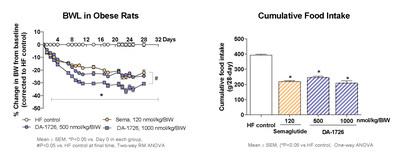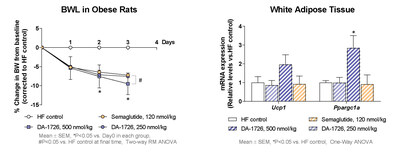NeuroBo Pharmaceuticals' Novel GLP1R and GCGR Dual Agonist, DA-1726, Shown to Elicit Superior Weight Loss Efficacy Compared to Semaglutide and Tirzepatide in Preclinical Models
- DA-1726 showed superior weight loss efficacy compared to Semaglutide and Tirzepatide in preclinical testing
- DA-1726 increased the expression of energy metabolism-related genes in white adipose tissues, supporting increased energy expenditure
- DA-1726 showed superior plasma triglyceride reduction and similar reduction of total cholesterol compared to Cotadutide
- DA-1726 showed similar maximum efficacy on weight loss compared to Tirzepatide but was more efficacious in improving plasma metabolic parameters
- None.
Insights
Analyzing...
Preclinical Data Also Show DA-1726 Effectively Reduces Body Weight and Glycemic Control
Data Presented in One ePoster Theater Discussion and Two General Poster Presentations at the American Diabetes Association 83rd Scientific Sessions
"DA-1726, a long acting OXM analog that binds and activates both GLP-1 and glucagon receptors using a well understood mechanism, has shown weight loss efficacy, despite similar or higher food intake, in a dose-dependent manner, that is better than SEMA in diet-induced obese (DIO) rats (
"In preclinical mice models, DA-1726 also showed the ability to improve plasma glucose insulin and Homeostatic Model Assessment for Insulin Resistance (HOMA-IR) as compared to Cotadutide (COTA), another OXM analog. Importantly, DA-1726 showed superior plasma triglyceride (TG) reduction and a similar reduction of total cholesterol (T-CHO) compared to COTA. In a comparative preclinical mouse study with GLP1R/glucose-dependent insulinotropic polypeptide receptor (GIPR) dual agonist, Tirzepatide (TIR), DA-1726 showed similar efficacy on weight loss, despite consuming more food. However, DA-1726 was more efficacious in improving plasma metabolic parameters such as glucose, TG, and T-CHO compared to TIR, indicating differential metabolic effects caused by GCGR agonism. Taken together, these data suggest that DA-1726 is a well-balanced GLP-1 receptor and glucagon receptor dual agonist and we anticipate that DA-1726 will have effective weight loss and glycemic control in humans," concluded Ms. Chae.
"DA-1726 is a long-acting, novel peptide drug candidate in preclinical development with therapeutic promise for obesity and NASH, in preparation for a phase 1 clinical trial for obesity," stated Joe Hooker, Interim President and Chief Executive Officer of NeuroBo. "Presenting two general posters and one ePoster theater discussion at this important scientific meeting provided us the ability to highlight positive preclinical data for DA-1726 as a potential treatment for obesity, and data showing superior effectiveness as compared to competitor peptide therapeutics including SEMA. During the second half of this year, our goal is to advance DA-1726 through the IND process. Assuming acceptance by the
Abstract Title: A Novel GLP1R/GCGR Dual Agonist, DA-1726 Elicits Weight Loss Superior to Semaglutide in Diet-Induced Obese Rats
Poster: 1676
Authors: Tae-Hyoung Kim, Il-Hun Jung, Kyumin Kim, Hyung Heon Kim, Mi-Kyung Kim, Yuna Chae
Presenter: Yuna Chae, Dong-A ST Research Center
Session: General Poster Session
Date and Time: Monday, June 26, 2023, 11:30 AM - 12:30 PM PDT
Location: Poster Halls B-C
DA-1726 showed superior weight loss efficacy compared to Semaglutide (SEMA) in diet-induced obese (DIO) mice. In this study, a dose-response of DA-1726 was evaluated to determine the maximum efficacy in DIO rats which are known for translatability to human studies. The half-life of DA-1726 was longer in rats compared to mice, however the in vitro activity of DA-1726 against rat glucagon receptor was less potent than in mice, and plasma protein binding was approximately 10-fold higher in rats. Therefore, the effective dose for rats was set higher than for mice. DA-1726 was injected twice a week for approximately 4 weeks, and a dose-dependent and significant weight loss effect was observed. The minimum effective dose in DIO rats was found to be 250 nmol/kg. Then, the maximum body weight loss effects of DA-1726 (500 and 1000 nmole/kg) and SEMA were compared in the DIO rat model. DA-1726 showed an excellent weight loss effect compared to SEMA (
DA-1726 showed equal or greater efficacy with higher food intake compared to Semaglutide in reducing body weight
DA-1726 showed significant increase in white adipose tissue gene expression suggesting energy expenditure's direct impact on weight loss
Abstract Title: Differentiated Metabolic Effects of DA-1726, a Balanced GLP1R/GCGR Dual Agonist
Authors: Il-Hun Jung, Tae-Hyoung Kim, Su Jin Lee, Hyung Heon Kim, Mi-Kyung Kim, Yuna Chae
Poster: 1668
Session: ePoster Theater
Date and Time: Sunday, June 25, 2023, 12:10 PM – 12:20 PM PDT
Location: Exhibit Hall (ePoster Theater A)
Session: General Poster Session
Date and Time: Monday, June 26, 2023, 11:30 AM - 12:30 PM PDT
Location: Poster Halls A-B
The pharmacological effect of DA-1726 was evaluated compared to other competitor peptides. DA-1726 showed superior efficacy compared to another GLP1R/GCGR dual agonist, Cotadutide (COTA), in reducing body weight (
DA-1726 showed similar efficacy with higher food intake compared to Tirzepatide in reducing body weight
Copies of the presentation materials are available on the NeuroBo Pharmaceuticals website at https://www.neurobopharma.com/presentations.
About NeuroBo Pharmaceuticals
NeuroBo Pharmaceuticals, Inc. is a clinical-stage biotechnology company on a quest to transform cardiometabolic diseases. The company is currently developing DA-1241 for the treatment of Non-Alcoholic Steatohepatitis (NASH) and Type 2 Diabetes Mellitus (T2DM), and is developing DA-1726 for the treatment of obesity. DA-1241 is a novel G-Protein-Coupled Receptor 119 (GPR119) agonist, which promotes the release of key gut peptides GLP-1, GIP, and PYY. In preclinical studies, DA-1241 demonstrated positive effect on liver inflammation, lipid metabolism, weight loss, and glucose metabolism, reducing hepatic steatosis, hepatic inflammation, and liver fibrosis, while also improving glucose control. DA-1726 is a novel oxyntomodulin (OXM) analogue that acts as a glucagon-like peptide-1 receptor (GLP1R) and glucagon receptor (GCGR) dual agonist. OXM is a naturally-occurring gut hormone that activates GLP1R and GCGR, thereby decreasing food intake while increasing energy expenditure, thus potentially resulting in superior body weight loss compared to selective GLP1R agonists.
For more information, please visit www.neurobopharma.com.
Forward Looking Statements
Certain statements in this release may be considered forward-looking statements within the meaning of the Private Securities Litigation Reform Act of 1995, including without limitation, statements about the closing of the offering of securities. Forward-looking statements are predictions, projections and other statements about future events that are based on current expectations and assumptions and, as a result, are subject to risks and uncertainties. Many factors could cause actual future events to differ materially from the forward-looking statements in this release, including, without limitation, those risks associated with our ability to execute on our commercial strategy; the timeline for regulatory submissions; the ability to achieve results in human clinical trials that are similar to those received in preclinical animal trials; NeuroBo's ability to achieve similar results in future preclinical trials; regulatory steps and potential regulatory approval of NeuroBo's current and future product candidates, the ability to realize the benefits of the license agreement with Dong-A ST Co. Ltd., including the impact on future financial and operating results of NeuroBo; the ability to integrate the new product candidates into NeuroBo's business in a timely and cost-efficient manner; the cooperation of our contract manufacturers, clinical study partners and others involved in the development of our current and future product candidates; our ability to initiate and complete clinical trials on a timely basis; our ability to recruit subjects for our clinical trials; costs related to the license agreement, known and unknown, including costs of any litigation or regulatory actions relating to the license agreement; changes in applicable laws or regulations; effects of changes to NeuroBo's stock price on the terms of the license agreement and any future fundraising; and other risks and uncertainties described in our filings with the SEC. Forward-looking statements speak only as of the date when made. NeuroBo does not assume any obligation to publicly update or revise any forward-looking statements, whether as a result of new information, future events or otherwise.
Contact:
Rx Communications Group
Michael Miller
+1-917-633-6086
mmiller@rxir.com
![]() View original content to download multimedia:https://www.prnewswire.com/news-releases/neurobo-pharmaceuticals-novel-glp1r-and-gcgr-dual-agonist-da-1726-shown-to-elicit-superior-weight-loss-efficacy-compared-to-semaglutide-and-tirzepatide-in-preclinical-models-301863706.html
View original content to download multimedia:https://www.prnewswire.com/news-releases/neurobo-pharmaceuticals-novel-glp1r-and-gcgr-dual-agonist-da-1726-shown-to-elicit-superior-weight-loss-efficacy-compared-to-semaglutide-and-tirzepatide-in-preclinical-models-301863706.html
SOURCE NeuroBo Pharmaceuticals, Inc.










